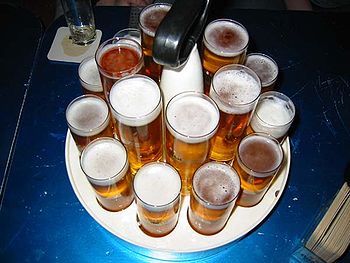This article needs additional citations for verification. (October 2024) |

Beer (German: Bier pronounced [biːɐ̯] ) is a major part of German culture. According the Reinheitsgebot (German beer purity law), only water, hops, yeast and malt are permitted as ingredients in its production.[1] Beers not exclusively using barley-malt, such as wheat beer, must be top-fermented.[2][3]
In 2020, Germany ranked third in Europe in terms of per-capita beer consumption, trailing behind the Czech Republic and Austria.[4]
The traditional serving of beer, known as a Kranz (wreath), is typically carried by a server ("Köbes") and contains traditional Stange glasses and, in the center, larger modern glasses.
- ^ "BierStDB - Verordnung zur Durchführung des Vorläufigen Biergesetzes". www.gesetze-im-internet.de. Retrieved 26 October 2024.
- ^ "Vorläufiges Biergesetz". Archived from the original on 9 September 2007. Retrieved 4 September 2007.
- ^ "492 Years of Good Beer". Der Spiegel. 23 April 2008. Archived from the original on 11 May 2011. Retrieved 26 May 2011.
- ^ "Beer consumption per capita Europe by country 2020". Statista. Retrieved 25 October 2022.